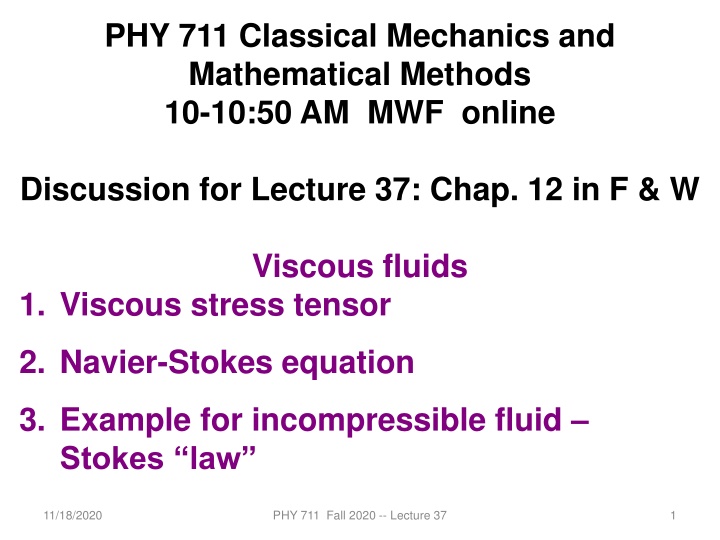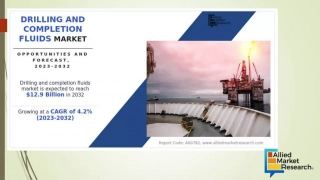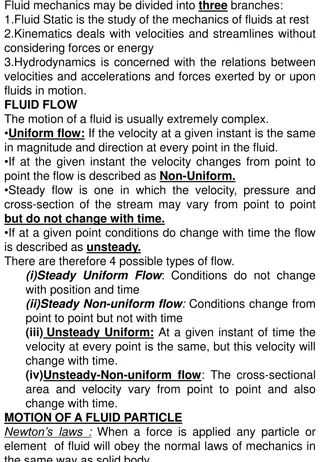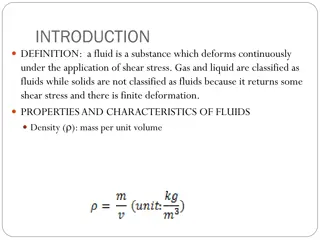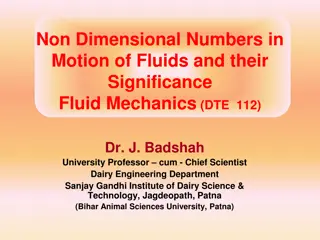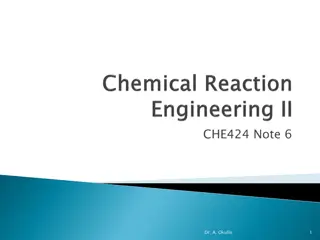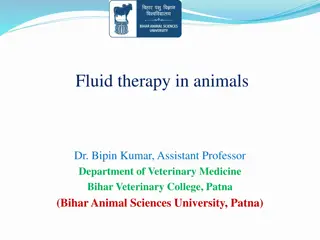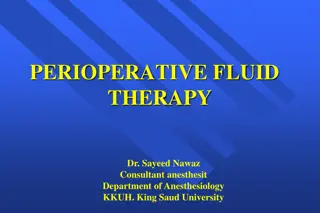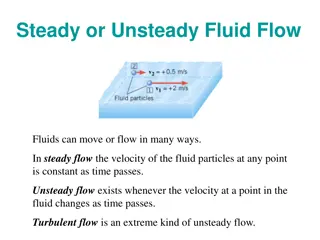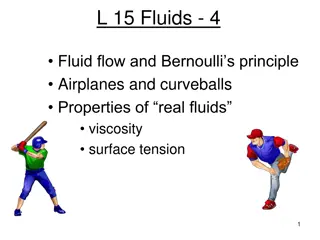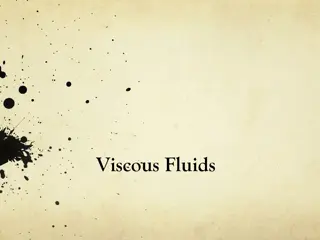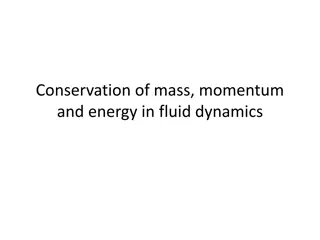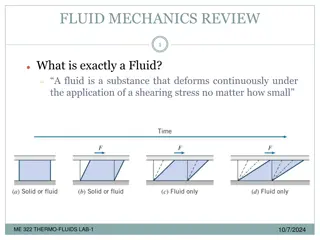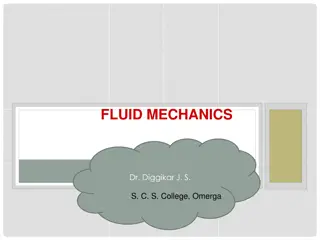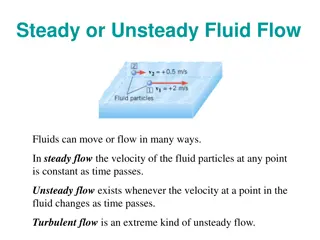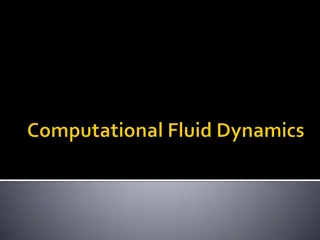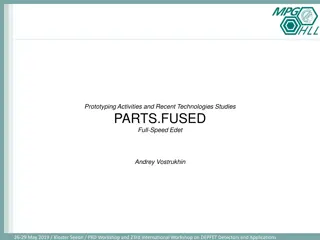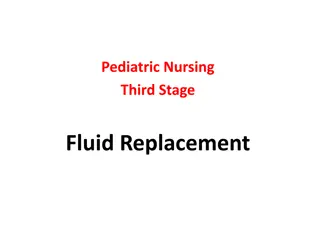Viscous Fluids and Fluid Dynamics Overview
This content delves into the principles of viscous fluids, stressing topics such as the Navier-Stokes equation, viscous stress tensor, and the effects of viscosity on fluid dynamics. Examples and equations for both non-viscous and viscous fluids are explored, providing a fundamental understanding of fluid mechanics.
Download Presentation

Please find below an Image/Link to download the presentation.
The content on the website is provided AS IS for your information and personal use only. It may not be sold, licensed, or shared on other websites without obtaining consent from the author.If you encounter any issues during the download, it is possible that the publisher has removed the file from their server.
You are allowed to download the files provided on this website for personal or commercial use, subject to the condition that they are used lawfully. All files are the property of their respective owners.
The content on the website is provided AS IS for your information and personal use only. It may not be sold, licensed, or shared on other websites without obtaining consent from the author.
E N D
Presentation Transcript
PHY 711 Classical Mechanics and Mathematical Methods 10-10:50 AM MWF online Discussion for Lecture 37: Chap. 12 in F & W Viscous fluids 1. Viscous stress tensor 2. Navier-Stokes equation 3. Example for incompressible fluid Stokes law 11/18/2020 PHY 711 Fall 2020 -- Lecture 37 1
Schedule for weekly one-on-one meetings (EST) Nick 11 AM Monday Gao 9 PM Tuesday Tim 11 AM Wednesday Jeanette 11 AM Friday Derek 12 PM Friday 11/18/2020 PHY 711 Fall 2020 -- Lecture 37 2
Your questions From Gao 1, Why can we let v be like this? 11/18/2020 PHY 711 Fall 2020 -- Lecture 37 3
11/18/2020 PHY 711 Fall 2020 -- Lecture 37 4 4
Thursday, Nov. 19, 2020 4 PM 11/18/2020 PHY 711 Fall 2020 -- Lecture 37 5
Equations for motion of non-viscous fluid N ew ton -Eul er eq uation f mo on: o t i v ( ) + = v v f p applied t Continuity equation: + ( ) ( ) = + = v v v 0 0 t t Add the two equa + t ion s: v ( ) ( ) + + v ( x ) = v v v v f p applied t t v jv 3 ( ) v = t 1 j j 11/18/2020 PHY 711 Fall 2020 -- Lecture 37 6
Equations for motion of non-viscous fluid -- continued Newton-Euler equation in terms of fluid momentum: = ( ) ( ) v v x v 3 j + = f p applied t 1 j j ( ) ( ) v v x v 3 j + + = f p applied t = 1 j j v Fluid momentum: + Stress tensor: T vv p ij i j ij th component of Newton-Euler equation: v i ( ) T x 3 i j + = i f i t = 1 j j 11/18/2020 PHY 711 Fall 2020 -- Lecture 37 7
Now consider the effects of viscosity In terms of stress tensor: + = ideal ij T = viscous ij p + T T ij = ideal ij T ideal ji v v T i j ij As an example of a viscous effect, consider -- Newton's "law" of viscosity v y A Fx F = x x vx(y) y A x material dependent parameter 11/18/2020 PHY 711 Fall 2020 -- Lecture 37 8
Effects of viscosity Argue that viscosity is due to shear forces in a fluid of the v y A form: drag F = x Formulate viscosity stress tensor with tracel = + ess and diagonal terms: 2 3 v x v x ( ) ( ) viscous kl T v v k l kl k l l k bulk viscosity viscosity Total stres = = + deal kl T viscous kl T i s tensor: + T kl dea kl T i l k l v v p kl 2 3 v x v x ( ) ( ) = + visc kl T ous v v k l kl k l l k 11/18/2020 PHY 711 Fall 2020 -- Lecture 37 9
Effects of viscosity -- continued Incorporating generalized str v T t x = ess tensor into Newton-Eu ler e q u ations ( ) 3 ij + = i f i 1 i j ( ) ( ) v x v 2 v v t 2 3 3 3 1 3 v p x i j j + = + + + i f i i 2 j x x x = = = 1 1 1 j j j j i i j Continuity equ a tion ( ) v 3 j + = 0 t x = 1 j j Vector form (Navier-Stokes equation) + = Continuity equation + = v v 1 1 1 3 ( ) ( ) + + + 2 v v f v v p t ( ) 0 11/18/2020 t PHY 711 Fall 2020 -- Lecture 37 10
Newton-Euler equations for viscous fluids Navier-Stokes equation 1 t v 1 1 3 ( ) ( ) + = f + + + 2 v v v v p Continuity condition + Typical viscosities at 20o C and 1 atm: ( ) = v 0 t (m2/s) 1.00 x 10-6 14.9 x 10-6 1.52 x 10-6 1183 x 10-6 (Pa s) 1 x 10-3 0.018 x 10-3 1.2 x 10-3 1490 x 10-3 Fluid Water Air Ethyl alcohol Glycerine 11/18/2020 PHY 711 Fall 2020 -- Lecture 37 11
Example steady flow of an incompressible fluid in a long pipe with a circular cross section of radius R Navier-Stokes equation 1 p t v 1 1 3 ( ) ( ) + = f + + + 2 v v v v Continuity condition + Incompressible flu = 2 v v v Note that ( ) ( ) ( ) = v 0 t = v id 0 v = Steady flow 0 t = v Irrotational flow No applied force =0 0 f ( ) v = 2 Neglect non-linear terms 0 11/18/2020 PHY 711 Fall 2020 -- Lecture 37 12
Example steady flow of an incompressible fluid in a long pipe with a circular cross section of radius R -- continued Navier-Stokes equation becomes: 1 0 p ( ) Assu me that , p v r z p z p v r L = + v 2 R ( ) = v r z t v r L z v(r) = 2 ( ) (independent of ) z z p = Suppo se that L (uniform pressure gradient) = 2 ( ) z 11/18/2020 PHY 711 Fall 2020 -- Lecture 37 13
Example steady flow of an incompressible fluid in a long pipe with a circular cross section of radius R -- continued p v r L d dv r p r r dr dr L pr v r C r L = = = = 2 ( ) z 1 ( ) R = z 2 L = + + v(r) ( ) ln( ) C 1 2 z 4 2 pR + 0 ( ) 0 C C v R 1 2 z 4 L p L ( ) = 2 2 ( ) v r R r z 4 11/18/2020 PHY 711 Fall 2020 -- Lecture 37 14
Comment on boundary condition ( ) R zv R = 0 L Fluid approximately stationary at boundary v(r) R 11/18/2020 PHY 711 Fall 2020 -- Lecture 37 15
Example steady flow of an incompressible fluid in a long pipe with a circular cross section of radius R -- continued p L ( ) = 2 2 ( ) v r R r z 4 R Mass flow rate through the pipe: 4 dM dt p R R = = L 2 ( ) rdrv r v(r) z 8 L 0 Poiseuille formula; Method for measuring 11/18/2020 PHY 711 Fall 2020 -- Lecture 37 16
Example steady flow of an incompressible fluid in a long tube with a circular cross section of outer radius R and inner radius R p L = 2 ( ) v r z R 1 r dr ( ) dr d dv r p L R = z r 2 pr = + + L ( ) ln( ) C v r C r 1 2 z 4 L 2 pR = = + + ( ) 0 ln( ) C v R C R 1 2 z 4 L p 2 2 R L = = + + ( ) 0 ln( ) C v R C R 1 2 z 4 11/18/2020 PHY 711 Fall 2020 -- Lecture 37 17
Example steady flow of an incompressible fluid in a long tube with a circular cross section of outer radius R and inner radius R -- continued Solving for an d : C C 1 2 2 2 2 1 pR r R r R R = ( ) 1 ln v r R z 4 l n L L Mass flow rate through th e pipe: ( ) 2 2 1 4 dM dt p R R = = + 4 2 ( ) 1 rdrv r z 8 ln L R 11/18/2020 PHY 711 Fall 2020 -- Lecture 37 18
More discussion of viscous effects in incompressible fluids Stokes' analysis of viscous drag on a sphere of radius moving at speed in medium with viscosity : 6 D F Ru = R u ( ) u FD Plan: 1. Consider the general effects of viscosity on fluid equations 2. Consider the solution to the linearized equations for the case of steady-state flow of a sphere of radius R 3. Infer the drag force needed to maintain the steady-state flow 11/18/2020 PHY 711 Fall 2020 -- Lecture 37 19
Have you ever encountered Stokes law in previous contexts? a. Milliken oil drop experiment b. A sphere falling due to gravity in a viscous fluid, reaching a terminal velocity c. Other? 11/18/2020 PHY 711 Fall 2020 -- Lecture 37 20
Newton-Euler equation for incompressible fluid, modified by viscous contribution (Navier-Stokes equation): p t v ( ) + = + 2 v v f v applied Kinematic vis cosity Typical kinematic viscosities at 20o C and 1 atm: (m2/s) 1.00 x 10-6 14.9 x 10-6 1.52 x 10-6 1183 x 10-6 Fluid Water Air Ethyl alcohol Glycerine 11/18/2020 PHY 711 Fall 2020 -- Lecture 37 21
Stokes' analysis of viscous sphere a on drag of radius R moving = speed at u medium in with visc osity : ( ) 6 F Ru u D F FD Effects of motion on force drag of particle of mass m with constant force : F du 6 = = with ) 0 ( 0 F R u m u dt 6 R F t = ( ) 1 u t e m 6 R 11/18/2020 PHY 711 Fall 2020 -- Lecture 37 22
Effects of motion on force drag of particle of mass m with constant force : F du 6 = = with ) 0 ( 0 F R u m u dt u 6 R F t = F ( ) 1 u t e m FD 6 R u t 11/18/2020 PHY 711 Fall 2020 -- Lecture 37 23
Effects of drag force on motion of particle of mass with an initial velocity with (0) du R u mdt = m = and no external force u U 0 = 6 u 6 R t ( ) u t U e FD m 0 u t 11/18/2020 PHY 711 Fall 2020 -- Lecture 37 24
Recall: PHY 711 -- Assignment #18 Oct. 26, 2020 Determine the form of the velocity potential for an incompressible fluid representing uniform velocity in the z direction at large distances from a spherical obstruction of radius a. Find the form of the velocity potential and the velocity field for all r > a. Assume that for r = a, the velocity in the radial direction is 0 but the velocity in the azimuthal direction is not necessarily 0. 0 = = + In the present viscous case, we will assume that v(a)=0. 2 3 a ( ) , cos r v r 0 2 2 r 11/18/2020 PHY 711 Fall 2020 -- Lecture 37 25
Newton-Euler equation for incompressible fluid, modified by viscous contribution (Navier-Stokes equation): p t = v Assume steady state: v ( ) + = + 2 v v f v applied Continuity equation: 0 v = 0 t Assume non-linear effects small Initially set applied p = v = f 0; 2 11/18/2020 PHY 711 Fall 2020 -- Lecture 37 26
= 2 v p Take curl of both sides of equation: 0 p = = ( ) ( ) 2 v Assume (with a little insight from Landau): = + v u ( ) ( ) f r u where ( ) 0 f r r Note that: ( ) ( ) = 2 A A A 11/18/2020 PHY 711 Fall 2020 -- Lecture 37 27
Your question why assume Assume (with a little insight from Landau): = ( ) ( ) f r + v u u u where ( ) 0 f r r FD ( , ) r v u 11/18/2020 PHY 711 Fall 2020 -- Lecture 37 28
Digression ( ) ( ) f r = + v u u Some comment on assumption: ( ) f r ( ) = 2 A A A ( ) ( = = A u Here ( ) ) v ( ) = = 2 v A A 2 Also note: = p ( ) = 2 2 v v or 0 p ( ) ( ) = 2 2 4 A A = 0 11/18/2020 PHY 711 Fall 2020 -- Lecture 37 29
( ( ) r ) = u + v u u f = u z ( v ( ) 0 ) ( ( ) ) ) = 2 z z z ) r ( f r f r f ( = = 2 v = 0 ( ) ( ) C = = 4 4 4 z z ) r ( 0 ( ) 0 ( ) 0 f f r f r = + + + 2 ( ) f r C r C r C 4 1 2 3 r 2 r dr 2 2 df C r C r = = 1 4 + cos 1 cos v u u C 2 4 1 r 3 2 1 r dr d f dr df C r C r = = 1 4 sin 1 sin v u u C 2 4 3 1 2 11/18/2020 PHY 711 Fall 2020 -- Lecture 37 30
Some details: 2 2 2 r dr d dr d = + = 4 ( ) f r 0 ( ) f r 0 2 C r z = + + + ) 2 ( ) f r 4 C r C r C 1 2 3 ( ) ( ( ) f r = + v z u ( ) ( ) ( ) ( ) f r + 2 z z z = ( ) f r u = r z Note that: = cos sin )( ) df dr ( ( ) 2 r v cos ( ) f r 1 cos si n u 11/18/2020 PHY 711 Fall 2020 -- Lecture 37 31
2 r dr 2 2 df C r C r = = 1 4 + cos 1 cos v u u C 2 4 1 r 3 2 1 r dr u d f dr df C r C r = = 1 4 sin 1 sin v u u C 2 4 3 1 2 = = = v v To satisfy ( To satisfy ( ) ) : 0 r R C 1 0 solve for , C C 2 4 3 3 2 R r R = + cos 1 v u r 3 2 r 3 3 4 R r R = sin 1 v u 3 4 r 11/18/2020 PHY 711 Fall 2020 -- Lecture 37 32
3 3 2 R r R = + cos 1 v u r 3 2 r 3 3 4 R r R = sin 1 v u 3 4 r Determining pressure: 3 2 R r = = 2 v cos p u 2 3 2 R r = ( ) p r cos p u 0 2 11/18/2020 PHY 711 Fall 2020 -- Lecture 37 33
3 2 R r = ( ) p r cos p u 0 2 Corresponds to: cos D F ( ) = 2 ( ) p R 4 p R 0 ( ) F = D 6 u R u FD 11/18/2020 PHY 711 Fall 2020 -- Lecture 37 34
